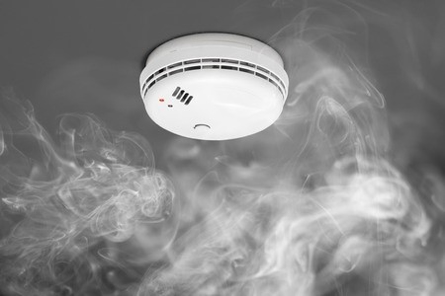According to the U.S. Fire Administration and FEMA, more than 3,500 Americans die each year in fires and approximately 18,300 are injured. Deaths from fires and burns are the third leading cause of fatal home injury. An overwhelming number of fires occur in the home. Statistics from the CDC note that about 85% of all U.S. fire deaths in 2009 occurred in homes and most victims of fires die from smoke or toxic gases and not from burns.
There are time-tested ways to prevent and survive a fire. It's not a question of luck. It's a matter of planning ahead.
Every Home Should Have at Least One Working Smoke Alarm
Over one-third (37%) of home fire deaths occur in homes without smoke alarms. Buy a smoke alarm at any hardware or discount store. It's inexpensive protection for you and your family. Install a smoke detector on every level of your home, including the basement, and particularly near rooms where people sleep. A working smoke alarm can double your chances of survival. Test it monthly, keep it free of dust and replace the battery at least once a year. Use long-life smoke alarms with lithium-powered batteries and hush buttons, which allow persons to stop false alarms quickly. If long-life alarms are not available, use regular alarms. Smoke alarms themselves should be replaced after ten years of service or as recommended by the manufacturer.
Alternate Heaters
Improperly maintained or used furnaces, fireplaces or heaters are one of the top causes of house fires. Have your home's central heating system maintained and cleaned regularly. Don't store combustible materials near a furnace. Chimneys and flues should be inspected annually, cleaned, and repaired as needed. It's especially important to eliminate creosote accumulation in flues and wood-stove pipes to avoid chimney fires. Keep fire in the fireplace and use metal screens or tempered glass doors. Never leave your home with a fire burning in your wood stove or fireplace. Do not allow young children to play near an active wood stove or fireplace. And don't leave them unattended in the room.
If you use space heaters, select ones that have been approved by a national testing laboratory. And check with your local fire department about acceptable types of space heaters - in many areas kerosene heaters are not permitted in residences. Portable heaters need their space. Never place portable heaters near flammable materials such as drapery. Keep anything combustible at least three feet away and always turn them off whenever you leave the house or go to bed. Never use gasoline or camp-stove fuel. Refuel outside and only after the heater has cooled.
Affordable Home Fire Safety Sprinklers
When home fire sprinklers are used with working smoke alarms, your chances of surviving a fire are greatly increased. Sprinklers are affordable - they can increase property values and lower insurance rates.
Plan Your Escape
Devise a family fire escape plan and practice it every 6 months. In the plan, describe at least two different ways each family member can escape every room. Everyone should know how to unlock windows, deadbolts, chain locks, and burglar bars. Caution everyone to stay low to the floor when escaping from fire and never to open doors that are hot. Train family members to help the elderly, the very young, and invalids during a fire escape. Select a location where everyone can meet after escaping the house. Get out then call for help.
Caring for Children
Children under five are naturally curious about fire. Many play with matches and lighters. Take the mystery out of fire play by teaching your children that fire is a tool, not a toy. Keep all matches and lighters out of reach of children. Store them up high, preferably in a locked cabinet.
Caring for Older People
Every year over 1,000 senior citizens die in fires. Many of these fire deaths could have been prevented. Seniors are especially vulnerable because many live alone and can't respond quickly.


